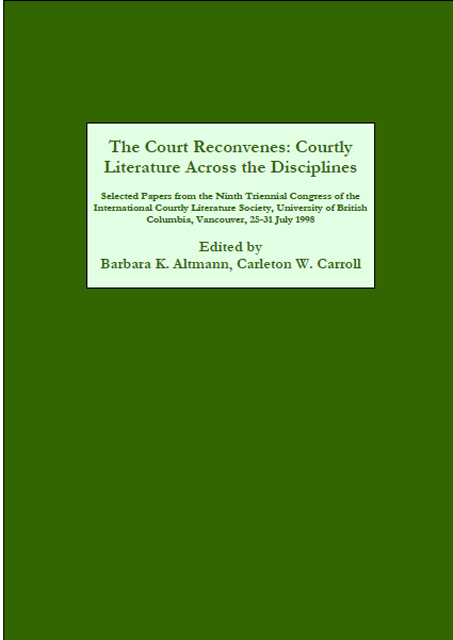 The Court Reconvenes
The Court Reconvenes The Ins and Outs of Court: Guiraut Riquier’s Poetics of Ostracism
Published online by Cambridge University Press: 31 March 2023
Summary
In his Libre or book of songs, the thirteenth-century troubadour Guiraut Riquier has left us a rich implicit account of his professional peregrinations, hopes, ambitions, resentments, and anxieties. His cansos and vers, which he carefully dated and anthologized, indirectly chronicle the career of a poet who scoured the courts of Southern France and Spain, from 1254 to 1292, in quest of wealth and social standing. Riquier's self-compiled chansonnier discloses two framing stories. One is the simulated autobiography of a lover. Riquier pretends to have spent many years of his life in wooing an idealized, distant lady, to whom he gives the sobriquet or senhal of Belh Deport (fine comportment, fair pastime). He arranges for this fictive lady to expire in 1282, exactly two thirds of the way into the chronological series of twenty-seven cansos and twenty-seven vers (Bossy, “Cyclical Composition” 284–86). The plot device of her death enables Riquier to anticipate the canzonieri of Dante and Petrarch by dividing his book of lyrics into two major sections, which one might entitle respectively in vita and in morte (Bossy, “Cyclical” 286–90, “Twin Flocks” 155–59). The book's second framing story tells of Riquier's quixotic search for an ideal patron, during almost forty years of poetic activity (a span of time doubtless meant to recall the children of Israel's forty years of wandering in the desert before entering the Promised Land). The perfect patron, according to Riquier, would display two essential qualities. Firstly, he would fully recognize and value Riquier's talents. Secondly, he would provide generous subsidies, and on a regular basis.
Throughout the book, Riquier never ceases to yearn for this paragon of a benefactor. Alas, he never finds him in this world. The perfect patron remains out of reach, as does Lady Belh Deport. To be sure, in the book's closing chapter, which covers the years 1283 to 1292, Riquier presents Christ as the ideal courtly lord and the Virgin Mary as the true prototype of Belh Deport in the realm of heaven. On earth, however, Belh Deport and the ideal patron continue to be for him two sides of the same, elusive coin. As readers of Riquier's compilation, we come to see that the lover's entreaties to Belh Deport are, in fact, a transparent fable for the poet's tug-of-war with a succession of male patrons.
- Type
- Chapter
- Information
- The Court ReconvenesCourtly Literature across the Disciplines: Selected Papers from the Ninth Triennial Congress of the International Courtly Literature Society, University of British Columbia, Vancouver, 25-31 July 1998, pp. 275 - 284Publisher: Boydell & BrewerPrint publication year: 2002


